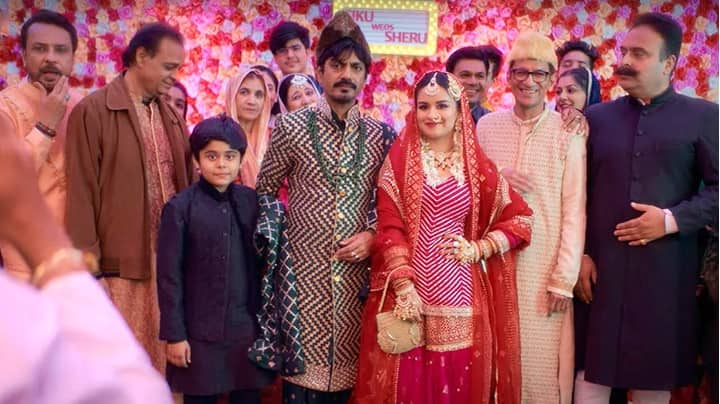Tiku Weds Sheru, which released on Friday, is produced by Kangana Ranaut's Manikarnika Films.
Picture this: A man who works as a background artist on film sets during the day and a pimp at night, barely makes enough money to survive. He has mortgaged his home to repay debts, but still hasn’t given up on his dream of being an actor. Shiraz Khan Afghani, nicknamed ‘Sheru’, played convincingly by Nawazuddin Siddiqui, is a manic pixie dream boy come to life. Unrealistic as it may be, Sheru’s dream of making it as an actor gets the best of him, to the point that he mouths dialogues as an extra in the background while the scene is being shot.
Sheru marries Tiku (played by an effervescent Avneet Kaur), a girl from Bhopal, who wants to make it big as an actress in Mumbai. For Tiku, the marriage is purely transactional in nature. She marries Sheru because she wants to escape her overbearing, abusive family and set up base in the City of Dreams. But it all comes crashing down when she finds out that she is pregnant with her boyfriend’s child.
What follows is a sequence of events which test both Tiku and Sheru. As punchlines become fewer in number and the humour fizzles out, the film takes a dark turn, bringing out harsh realities of the much-romanticised city of dreams. Director Sai Kabir, who wrote Revolver Rani (2014), critiques the wealth disparity in Mumbai and classicism, while also calling out the exploitation in showbiz. "Hum log gattar ki duniya mein rehte hain. Jab tak yaha hai, zinda hai. Bahar nikle toh mar jaenge” (We are meant to live in filth. Till the time we are here, we will be safe. If we step out, we will be killed), says Anand (Sheru’s friend, played by Mukesh S Bhatt) when Sheru requests him for a selfie with Akshay Kumar.
 A still from 'Tiku Weds Sheru'.
A still from 'Tiku Weds Sheru'.
As the film progresses, Sheru feels inadequate as a husband because he is not able to fulfill Tiku’s material desires. The pressure to provide gets the best of him — at one point, he breaks into the vanity of a female lead actress and steals a dress worth Rs 1.5 lakh for Tiku. Anand’s reminder to Sheru therefore was meant to be a brutal reality check — no matter how hard Sheru tries to get out of the filth, he is stuck in it forever.
In another scene, Sheru tells Tiku: "Ek din America le jaunga tujhe. Waha har bachcha English mein bolta hai". Sheru’s desire to transcend class hierarchies and live a life of luxury, just like the upper-class elite, is palpable. Overbearing as this desire may be, it doesn’t get the best of Sheru or Tiku. While they aspire to attain the social and cultural capital that only the privileged possess, they aren’t ashamed of being themselves. They speak grammatically incorrect English unapologetically and have outlandish dance-offs in clubs. They own their identity and use phrases like “Yo Papaji, Wassup”, cringeworthy as they may be. They want to make a space for themselves in a world that looks through them. But for that, they are not willing to erase their identity — the rich be damned.
In one scene, Tiku says “Humse na gareebi bardaasht nahi hoti. Gareeb hone se achcha hai marr jaana”. The line is very telling, especially in the context of the Mumbai dream, which makes people from remote towns leave their homes in search of a better life. What happens when it all comes crashing down? While Sai Kabir celebrates the Mumbai dream, he doesn’t paint an unrealistically rosy picture of the same. The last 30 minutes of the film where Tiku is forced into prostitution are grim. It shows how little space Mumbai has for those on whose backs it was built. It also shows not all dreams come true.
 A still from 'Tiku Weds Sheru'.
A still from 'Tiku Weds Sheru'.
But make no mistake, despite its many wins, especially a realistic portrayal of Mumbai life, Tiku Weds Sheru is not a film without flaws. For starters, the subplot which involves a closeted homosexual politician, shows Nawaz, a straight man, play-acting a gay man in a few scenes. In all of them, Nawaz gesticulates in an effeminate manner. For a film that opens with a disclaimer which mentions that the film does not mean to offend the LGBTQIA+ community, Tiku Weds Sheru leaves much to be desired. Nawaz’s act in drag, which he uses to out the gay politician without his consent, also comes off as extremely problematic.
Another scene where Sheru (Nawaz) slaps Tiku (Avneet) in the middle of the street after she attempted suicide, is written in extremely poor taste. There is also a Kangana Ranaut cameo and an oblique reference to how she helps “outsiders” in the industry, except, her security doesn’t let outsiders like Tiku reach her. Perhaps, this was meant to be meta commentary on how enabling access to outsiders in the industry is easier said than done.
Despite its flaws, Tiku Weds Sheru uncovers and lays bare the many trials and tribulations of pursuing the Mumbai dream. Towards the end, both Tiku and Sheru make peace with living their fantasy of being the lead actors while being extras on set. The camera rolls and the couple mouths dialogues, living in a fantasy world of their own. Delusional as it may seem, it is something to hold on and, sometimes, that is all one needs.
Tiku Weds Sheru is streaming now on Prime Video.